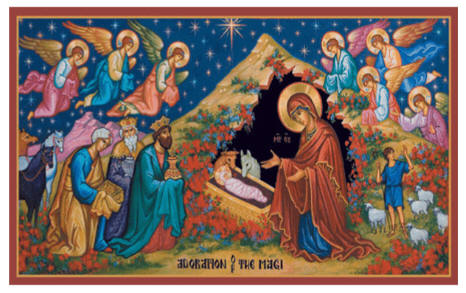The Apocalypse of Christmas
A Feast of good feelings, also a Revelation about End Times

Source:
The Apocalypse of ChristmasA Feast of good feelings, also a Revelation about End Times
Source:
|
|
Few people think of Christmas as the End of the World. We have one set of feelings and thoughts for the former and another set for the latter. Christmas, taken by itself, seems quite harmless and able to be adopted or adapted (in one way or another) by cultures at large. Indeed, some cultures adopt Christmas and forget about the Child in the Manger. A feast of good feelings, goodwill among men (etc.), a bit of family and seasonal food, and you have a feast that is free of offense allowing it, incidentally, to be monetized for the widest possible consumption. The End of the World, on the other hand, suggests judgment, wars, and rumors of wars, and, of course, the very offensive reminder that this world will not last and neither will we. As such, apocalyptic ideas are useful only as fantasy entertainment, a bit of a scare that disappears when the theater’s lights come back up. Popular culture has lost the meaning of the word “apocalypse” (and its derivatives). It has been drowned in a world of half-baked Christian misuse and Hollywood nightmares. Indeed, the word has been bastardized into “snow-pocalypse,” and other such faux events. It now seems to mean nothing more than “a big thing.” The word has a much more important place in theology. “Apocalypse” means to reveal that which is hidden. St. Paul describes the whole of the Christian gospel in this manner:
In this proper sense, the whole of the gospel is “apocalyptic.” It is something which, though once hidden from the world, is now revealed and made known. Christmas as an apocalyptic event. It happens in “hiding.” Word leaks out and the wicked king, Herod, goes on the warpath. Through the silent means of a star, wise men from Persia make their way to Bethlehem, inadvertently alerting the wicked king. The mystery, however, is so well hidden that St. Paul tells us that the “princes of this world” (demonic forces) did not really understand what they were doing when they crucified the Lord of Glory (1Cor. 2:8). We take the Christmas story for granted, reducing this great mystery to a card with well wishes. What was taking place, however, was truly “apocalyptic.” In that moment (or in the moment of the Annunciation nine months earlier) the world was turned inside out. The Lord of Glory, the Logos of God, the very meaning of the universe itself, entered our history and became a “historical figure.” The Godhead was now “veiled in flesh.” Simple shepherds kept watch with the very angels of heaven. Bethlehem (the “house of bread”), became the place where the Bread of Life Himself was first seen. In Him, all of the world would be fed – our true hunger banished. American horror movies (that deeply misunderstand the apocalypse) have made much of an impending doom – various schemes in which people try to prevent the anti-Christ from being born. They fail to understand the nature of the apocalypse (they’ve spent too much time reading popular Protestant fiction). What has been hidden from the ages and is made manifest in the birth of the Christ Child is the entry into our world of the Kingdom of God. It is the birth of our salvation. The true Apocalypse is good news. Evil is not hidden, except to the extent that it uses lies, darkness, and deception to distract our attention. We can see its work of chaos, murder, and deceit all around us. The apocalypse prophesied in the Scriptures is not the revelation of evil, but the final manifestation of the Good, the triumph of the Kingdom of God.
And,
But, just as Christ coming as a babe was hidden from those wicked powers, so His presence among us now, and His coming in the End, remains hidden. Frequently, Christians themselves fail to see more than a system of moral teaching and a promise of life after death. The Kingdom itself (which is “in you”) is unknown. Where, in truth, we are already resident aliens, we, instead, live as though this world is our home and “working the system” our only hope. There is a purpose in the hiddenness of God’s work. The depth of that mystery is found in the reality of the human heart. Christ teaches:
The mystery of the Kingdom of God is made known to a heart that asks, that seeks, that knocks. It is a heart that has returned to the desire that is given to us in the gift of our nature. It represents the re-awakening of the heart, the re-birth of the true self and the re-discovery of wonder. Bound in a world of information that falsely imagines that knowledge, power, management, and expertise are the secrets to well-being, we fail to see that such an orientation is itself the seat of our sickness. The heart that asks, seeks, and knocks is a heart that reflects the heart of God. It is a mode of being that allows us to rightly love, to properly desire, and to see what is hidden from the grasping hands of a controlling mastery. The apocalypse of Christmas, the revelation of God-made-man, is also the revelation of the image of God in man. It teases us and beckons our hearts to the hidden things. The apocalypse is revealed within us. Ask to know Him. Seek to find Him. Knock on the closed door of the heart until a crack is found. Christ is born!
|
Article published in English on: 25-12-2017.
Last update: 25-12-2023.